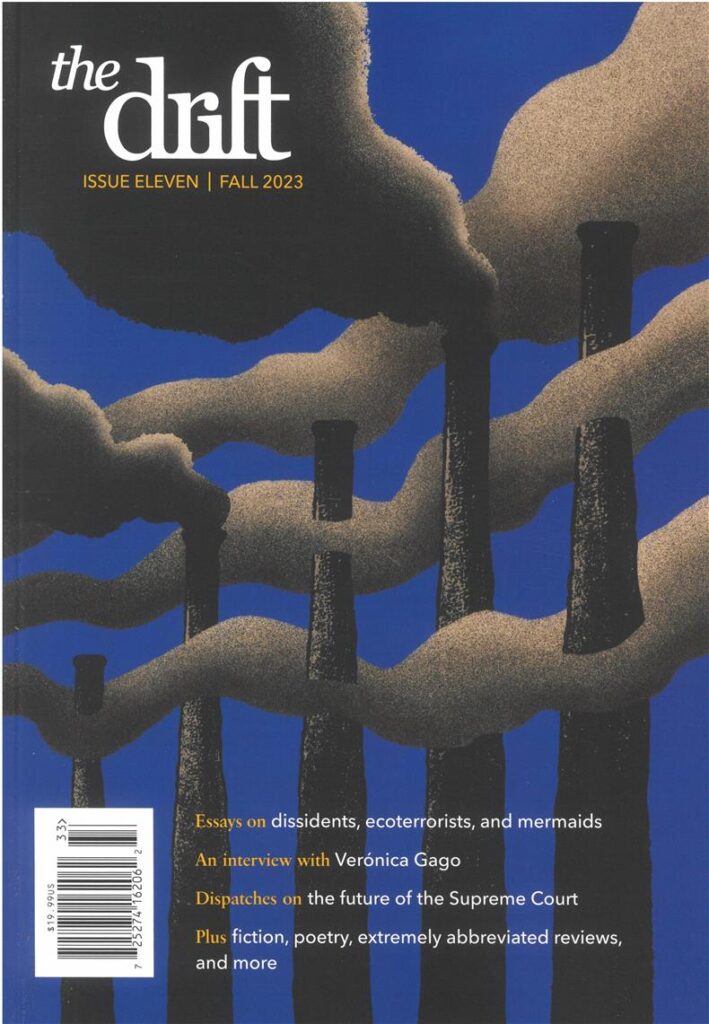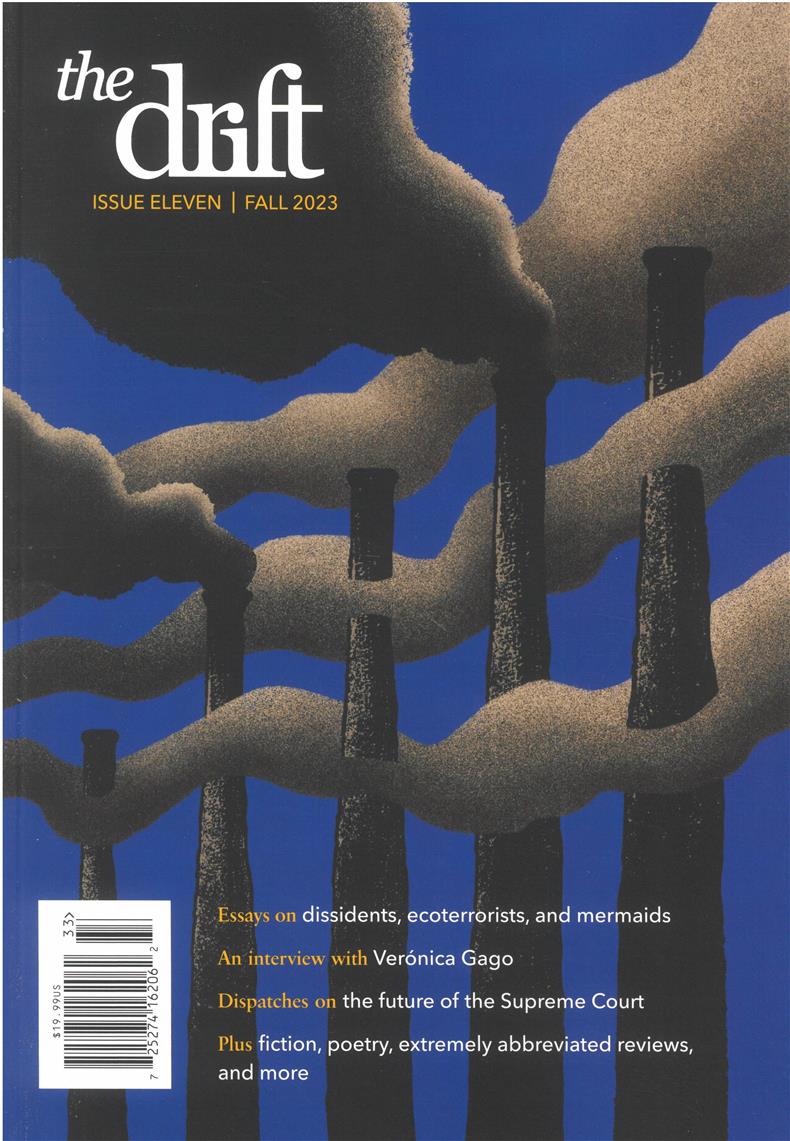Magazine Review: The Drift Fall 2023 edited by Kiara Barrow and Rebecca Panovka
This one’s a relatively new literary magazine, having started during the pandemic. The editorial slant appears to be socialist and class-conscious. Let’s see what this issue has to offer us.

The opening editorial is on “Corrupt Organizations”, talking about the use and misuse of RICO as a weapon against alleged conspiracies. Sure, using it against a politician who is most assuredly working against the best interests of America sounds cool, but it can also be used against legitimate protestors against police abuses. Then the essay tries to tie the theme into the various pieces appearing in this issue.
“The Logic of Plunder” is an interview with Verónica Gago, a professor of social sciences at the University of Buenos Aires. She is a leader of the Ni Una Menos (“not one (woman) less”) movement in her home country and influential internationally. She talks about its roots in protesting murderous violence against women, and its wider ties to unions, economic justice, and LGBTQ+ rights. Professor Gago also talks about “neo-extractivism”, how foreign monetary interests have adapted to no longer being able to simply strip-mine Latin American resources, using national debt to force “austerity” that keeps economies from growing out of poverty for the masses. And she has some relatively nice words to say about Alexandra Ocasio-Cortex!
“We Can No Longer Afford Illusions: The Supreme Court and the Left” is a collection of short essays on the subject of the U.S. Supreme Court. As you can guess, the general tenor is very critical of the current sitting justices and their decision-making process. It’s noted that one of Justice Gorsuch’s few areas of integrity is attention to Indian treaties, but that this is not shared by his conservative colleagues. There’s several calls for reform ranging from mild to radical.
“Truth to Power: Our Dissident Obsession” by Alexander Wells looks at the love affair Western media has had with “dissidents”, primarily against Communist governments. The label was used for a relatively thin slice of people opposed to Communist dictatorships, mostly of a literary bent, ignoring people who were opposed to oppressive governments for the wrong reason, or the oppressive governments that were on “our side.” And the narrative also tended to elide less palatable sides of the dissidents (“he’s said some pretty nasty things about Jewish people, but he’s against the Comintern, so let’s just put that aside for the moment.”) And modern pundits are trying to grab the prestige of the “dissident” label for themselves, especially unsavory ones who are not facing nearly as much danger as the Cold War originals.
“Can the Sireniform Speak?: Devolving with The Little Mermaid” by Sophie Lewis takes a look at the various versions of Hans Christian Andersen’s famous fairy tale, including an earlier German story, Undine, which strongly influenced Mr. Andersen. It looks at themes of colonialism and queer-coding in the stories and movies (including Splash, Disney’s first try at the story.) The essay suggests that the most recent remake may have obscured older themes in favor of a stab at more feminism and racial inclusion.
“Basic Behavior: Mary Gaitskill Posts Her Drafts” by Hannah Gold is an examination of the work of the author in question, including her Substack internet posts, which appear to have brought her more online fame. Over time, her appraisal of the dynamics of sexual harassment has changed a bit, as she examines how memories of the events can change attitudes as time and new information roll in. Since this is my first time hearing about this author, I’m not qualified to judge if this is a fair assessment of her work.
“The War on Ecoterror” by Gaby Del Valle looks at the roots of the radical environmental movement in North America, which turns out to have some unfortunate ties to racism. “We must preserve our pristine wetlands by banning immigrants from less ‘enlightened’ countries!” Which caused violent action against polluters and clearcutters to have some odd political bedfellows. Eventually, the right-wingers decided that nativism was more relevant to their interests than environmentalism. That’s why the current ecoterrorists usually come across as leftist, but some of the old racism has crept back in over the years.
“Lost in Translation: On J.M. Coetzee’s The Pole” by Ella Fox-Martens is about another author I’m learning about for the first time. Mr. Coetzee turns out to be a South African author of primarily Boer extraction. Prior to the end of apartheid, he was a courageous voice standing against the system in his writing. Since that time, he’s faded a bit into obscurity and now resides in Australia. His work deals a lot with miscommunication and the difficulty of being understood, with silence often as the only way to communicate. The current book, about a Polish author living in Catalonia, misses some tricks according to the reviewer. Catalonians have their own language struggles with the Spanish government, but that’s entire absent from the novel. She concludes that perhaps Coetzee is no longer an important voice for South Africa…there has been a whole new generation that never knew apartheid, for whom Coetzee is a relic from the past.
Of the essays, I found the one on mermaids most interesting. On to the fiction section!
“Dorchester” by Steven Duong takes place in that neighborhood of Boston. A Vietnamese woman is stabbed to death, and a Vietnamese-American poet is inspired to write a poem about the event, using a fictionalized version of himself as the viewpoint character. It’s apparently a very good poem, but it brings up mixed feelings in him because he has a dark secret about a horrible thing his mother did–and it’s not what you might think.
“Davy” by K. Patrick concerns a woman who checks in to a supposedly haunted bed & breakfast (she missed the advertising of the ghosts.) She’s mourning the death of her beloved dog Davy, and has a drunken encounter with the desk clerk.
“Greenness” by Xavier Blackwell-Lipkind has a college student become obsessed with an earworm of a song. Lots of alliteration as it takes over his life.
“Moments of Elevation” by Eliza Barry Callahan is an extract from her upcoming novel The Hearing Test. A musician suddenly loses much of her hearing range, and this affects her in various ways. Most of this fragment is her interacting with a hypnotherapist to get more comfortable with her new situation. There’s also a subplot about a radio signal coming from Russia. It’s haunting, but difficult to say if this can be stretched into an interesting longer plot.
None of these stories are to my taste, but Moments was the most affecting.
There’s a poetry section, of course, and it is once again all that modern poetry I don’t get. The most interesting of the lot is “The Ghosts of the Dead Sea Are Rising” by George Abraham, which is nigh-unreadable but does some nifty structural stuff by repeating a word over and over between other words and phrases with one letter at a time vanishing and weaving that into the surrounding words.
“Mentions” is a set of mini-reviews of various things, one (long sometimes) paragraph each. Films, books, legislation. One is of Oppenheimer (2023), with the review mostly being a plug for another film that the reviewer thinks did a better job with the subject matter.
There’s also a new “Letters” section, mostly reacting to a piece on the avant-garde. Pretty opaque to me.
Overall, I like the heavier concentration on essays than literary fiction or poetry. It doesn’t hurt that the political slant is compatible enough with my own that I never wanted to throw the magazine across the room. The fiction section was much weaker, and I can’t speak to the poetry.
Recommended to literary magazine fans who are okay with a socialist bias.

